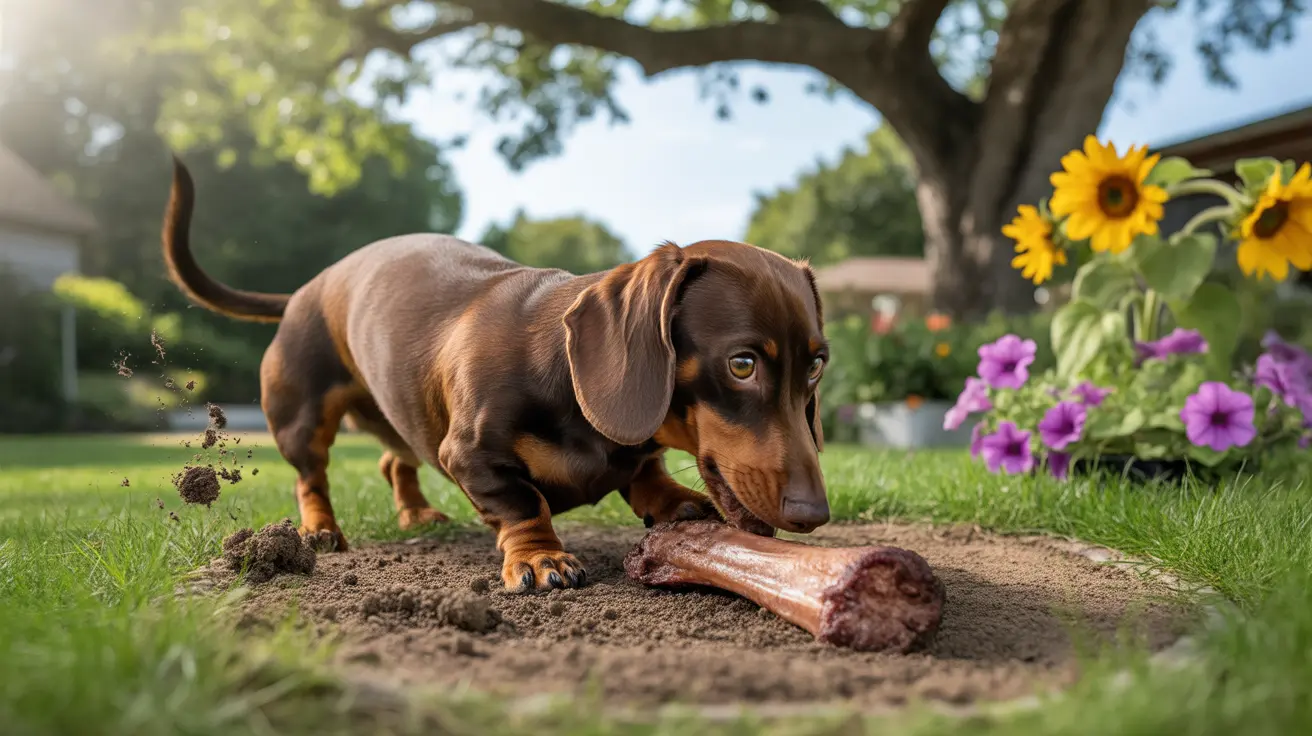If you've ever watched your dog enthusiastically dig holes in the yard to stash away their favorite bones or toys, you're witnessing an ancient instinct at work. This fascinating behavior, known as "caching," has deep roots in canine evolution and continues to manifest in our domestic pets today, even when they have no real need to store food for later.
Let's explore the fascinating reasons behind this age-old behavior and understand what it means for our four-legged friends.
The Ancestral Origins of Bone Burying
This behavior traces back to your dog's wild ancestors - wolves and wild dogs - who needed to ensure their survival in unpredictable environments. When these wild canids made a successful kill, they couldn't always consume the entire prey at once. To preserve excess food for leaner times, they would bury their leftovers in cool, moist soil.
This survival strategy proved so successful that it became hardwired into canine DNA, passing down through generations to our modern domestic dogs. Even wolf pups demonstrate this instinct, often moving their cached food to prevent siblings from finding it.
The Science Behind Burial Benefits
When your dog buries bones or food, they're unknowingly using nature's refrigeration system. The cool, dark soil creates ideal preservation conditions:
- Lower temperatures below ground help prevent food spoilage
- Soil blocks sunlight that could accelerate decomposition
- Earth naturally masks food odors from other animals
- Moisture in the soil helps maintain food freshness
Modern Reasons for Burying Behavior
Today's dogs don't need to preserve food for survival, but they continue this behavior for various reasons:
Protecting Valuable Resources
Dogs often bury items they consider precious, whether it's food, toys, or even your missing socks. This behavior stems from their instinct to protect valuable resources from other animals or pets in the household.
Emotional and Physical Needs
Dogs might engage in burying behavior due to:
- Stress or anxiety management
- Excess energy or boredom
- Desire for attention or play
- Natural enjoyment of the digging activity
- Comfort-seeking behavior
Breed-Specific Tendencies
Some dog breeds are more likely to exhibit burying behavior than others. This is particularly common in:
- Hunting breeds (Dachshunds, Beagles, Basset Hounds)
- Terrier breeds (all 31 recognized varieties)
- Working breeds (Miniature Schnauzers)
- High-energy breeds (Border Collies, Australian Shepherds)
- Northern breeds (Alaskan Malamutes, Siberian Huskies)
Frequently Asked Questions
Why do dogs bury bones if they're well-fed?
Dogs bury bones regardless of hunger due to their deeply ingrained instincts. This behavior is hardwired into their DNA from their wild ancestors, and regular feeding doesn't override this natural impulse.
How can I stop my dog from digging up the yard to bury bones?
Provide alternative activities, increase exercise, use designated digging areas, and ensure plenty of mental stimulation. You can also limit access to items they typically bury and supervise outdoor time.
What dog breeds are most likely to bury bones and toys?
Hunting breeds, terriers, and working dogs are most prone to burying behavior. This includes breeds like Dachshunds, Beagles, Jack Russell Terriers, and Miniature Schnauzers.
Is it harmful for dogs to dig and bury things compulsively?
While normal burying behavior isn't harmful, compulsive digging might indicate anxiety, boredom, or stress. Consult a veterinarian if your dog's burying behavior becomes excessive or obsessive.
Why do dogs bury non-food items like toys or socks?
Dogs bury non-food items because they consider them valuable resources worth protecting. This behavior extends from their natural instinct to cache important items for later use, whether they're edible or not.






